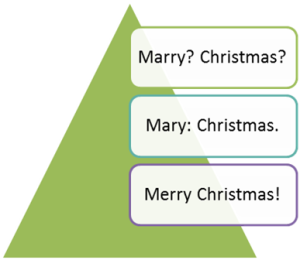 The title above is perhaps an unlikely but perfectly logical and complete sentence, albeit a string of homophones – that is, words where the phones (a linguistic term for sounds) are pronounced the same but spelled differently. In fact, the word phone is a homograph. That is, words spelled alike but with different meanings; phone can mean either a telephone or a sound. Homophones and homographs like these clearly illustrate the complexity of spelling and meaning in English. And these are the tip of, you know, an underwater mountain of ice. To the delight of comedians, English has thousands.
The title above is perhaps an unlikely but perfectly logical and complete sentence, albeit a string of homophones – that is, words where the phones (a linguistic term for sounds) are pronounced the same but spelled differently. In fact, the word phone is a homograph. That is, words spelled alike but with different meanings; phone can mean either a telephone or a sound. Homophones and homographs like these clearly illustrate the complexity of spelling and meaning in English. And these are the tip of, you know, an underwater mountain of ice. To the delight of comedians, English has thousands.
Movements such as the Simplified Spelling Society have proposed that words be spelled as pronounced. So we could choose any of the three words and rewrite the sentence as “Marry marry Marry!” or “Merry merry Merry!” or “Mary mary Mary!” There are obvious limitations to such a solution. The alternative would be a generic phonetic spelling such as “Meri meri Meri!” Again, hurdles to overcome. In truth, Oxford shows slight variations in the first vowel sound, but in the general “broadcast” American English pronunciation, all three are pronounced the same. So whose pronunciation should we use?
The etymology, origins, of the words are different of course, see Oxford Dictionaries online.
marry: Middle English: from Old French marier, from Latin maritare, from maritus, literally ‘married’, (as a noun) ‘husband’.
merry: Old English myrige ‘pleasing, delightful’, of Germanic origin; related to mirth.
And Mary as a name – the traditional spelling – has many variations as well, including Merry.
By reducing English spelling to reflect pronunciation could potentially mean the loss of rich historical and cultural information as well as the problems of which standard of pronunciation to use. So we are back to the beginning.
I would never have thought that “marry,” “merry,” and “Mary” were all pronounced the same. Where I come from, they are each quite distinct in sound.
LikeLike
Yes, as Oxford shows all three can be different. I am from Seattle and they are the same for me. Well, I could try to differentiate between them but it would be artificial for my dialect and the differences would disappear again in normal speech…at a normal to fast rate of speech. I could pronounce them uniquely, in isolation, but with effort. That’s my point about whose pronunciation would be used to determine a phonetic spelling. On a worldwide basis, there is a great deal of variation and it keeps changing with more global use and contact.
LikeLike
There’s an Irish (Some say Scottish) pub song of unknown origin that starts out “Mary Mack’s mother’s makin’ Mary marry me”…… Sure and begorrah, it’s out there on YouTube.
My favorite homophones are “to”, “two”, “too”.
LikeLike
Thanks! I will definitely check that out…
LikeLike